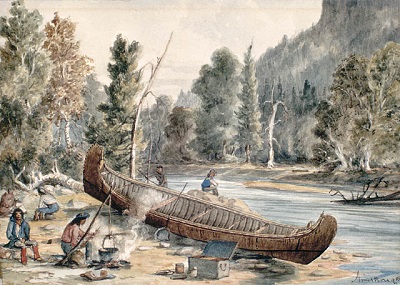Kaministikwia and Pigeon River Routes National Historic Event
Kakabeka Falls, Ontario

Camp on the Kaministikwia River
© Bibliothèque et Archives Canada | Library and Archives Canada, no d'acc 1970-188-1951 / Acquis avec l'aide du Secrétariat d'État | Purchased through a grant from the Secretary of State; Collection de canadiana W.H. Coverdale
Address :
Kakabeka Falls Provincial Park, Kakabeka Falls, Ontario
Recognition Statute:
Historic Sites and Monuments Act (R.S.C., 1985, c. H-4)
Designation Date:
1925-05-25
Other Name(s):
-
Kaministikwia and Pigeon River Routes
(Designation Name)
-
Kaministikwia Portage
(Plaque name)
Importance:
This designation has been identified for review
Plaque(s)
Existing plaque: Kakabeka Falls Provincial Park, Kakabeka Falls, Ontario
This chain of rivers, lakes and portages linking the St. Lawrence system with the waterways of the prairies had been known to the Indians for centuries when Jacques de Noyon first travelled it in 1688. After 1800, when the boundary settlement had placed the more southerly Grand Portage in the United States, the North West Company re-opened the Kaministikwia route, which for almost 25 years was the main highway to the west. From Fort William at the mouth of the river canoes were tracked upriver to this point, the first major obstacle on the route.
*Note: This designation has been identified for review. A review can be triggered for one of the following reasons - outdated language or terminology, absence of a significant layer of history, factual errors, controversial beliefs and behaviour, or significant new knowledge.